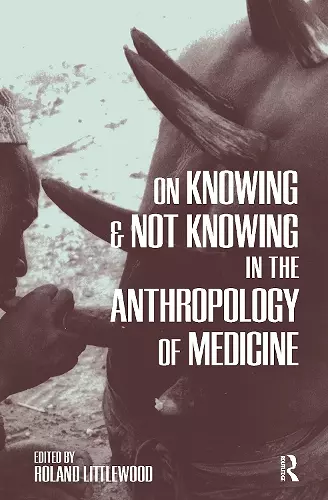On Knowing and Not Knowing in the Anthropology of Medicine
Format:Hardback
Publisher:Left Coast Press Inc
Published:15th Feb '07
Currently unavailable, our supplier has not provided us a restock date
This hardback is available in another edition too:
- Paperback£42.99(9781598742756)

Social scientific studies of medicine typically assume that systems of medical knowledge are uniform and consistent. But while anthropologists have long rejected the notion that cultures are discrete, bounded, and rule-drive entities, medical anthropology has been slower to develop alternative approaches to understanding cultures of health. This provocative volume considers the theoretical, methodological, and ethnographic implications of the fact that medical knowledge is frequently dynamic, incoherent, and contradictory, and that and our understanding of it is necessarily incomplete and partial. In diverse settings from indigenous cultures to Western medical industries, contributors consider such issues as how to define the boundaries of “medical” knowledge versus other kinds of knowledge; how to understand overlapping and shifting medical discourses; the medical profession’s need for anthropologists to produce “explanatory models”; the limits of the Western scientific method and the potential for methodological pluralism; constraints on fieldwork including violence and structural factors limiting access; and the subjectivity and interests of the researcher. On Knowing and Not Knowing in the Anthropology of Medicine will stimulate innovative thinking and productive debate for practitioners, researchers, and students in the social science of health and medicine.
"Medical knowledge is transient. Practices and protocols change, rapidly or over time, and old knowledge co-exists with the new. In addition, researchers may find conflicting data which co-exists for as long as those who learn it practice, and the field is rife with intuitive bits of information. And yet, medical anthropology is slow to change from the otherwise abandoned notion that cultures are discrete, bounded and rule-driven. This collection of 12 essays examines the ways a variety of cultures locate boundaries of medical knowledge, understand conflicts and changes, and create cultures of health. Topics include colonial and post-colonial medical thinking, bias in fieldwork, oversystematization, ambivalence in integrative medicine, the consequences of not knowing in medical and psychiatric settings, cultural forces on sexual knowledge, linking borders in indigenous health practices, the constraints of violence, treatment of youth, and the role of religious-based mores and standards and practices of care." -Book News, Inc. "Editor Littlewood (Univ. College London) has gathered an impressive group. to consider what can and cannot be known about sickness and social suffering in a range of locales (primarily African), based on fieldwork conducted over the last 25 years. Recommended." -CHOICE Magazine "...This edited compilation is a delightful text containing much 'food for thought.' The readings range from discussing the problems with current theoretical models of medical anthropology to the conflicts and challenges of fieldwork."... - American Anthropologist "...Roland Littlewood, editor of On Knowing and Not Knowing, suggests that the time is overdue for medical anthropology to question the concept of a medical system that underlies much work in medical anthropology. The book should succeed in making scholars of medicine second-guess their use of medical system" as convenient shorthand that implies a non-existent unity and coherence.The authors of this volume answer Last's call to pay attention to the importance of not knowing" in different ways. Littlewood and Lewis propose that we should not want to know more, warning about over-interpretation. Reynolds and van der Geest, on the other hand, propose to rectify what we should want to know about in anthropology; the first about the plight of youth in war and human rights concerns and the latter about defecation - both with a plea to give more attention to the lived experience of everyday life. All healing practices are only partially known by individuals, limited by different standards, yet flexible in time and in space. This pluriverse is a reminder that disciplines should remain humble, as illustrated as well by Skultans and van Dongens who clearly show how fieldwork can only reveal part of the complexity of healing practices."... -Julie Laplante and Ari Gandsman, Transcultural Psychiatry
ISBN: 9781598742749
Dimensions: unknown
Weight: 521g
244 pages